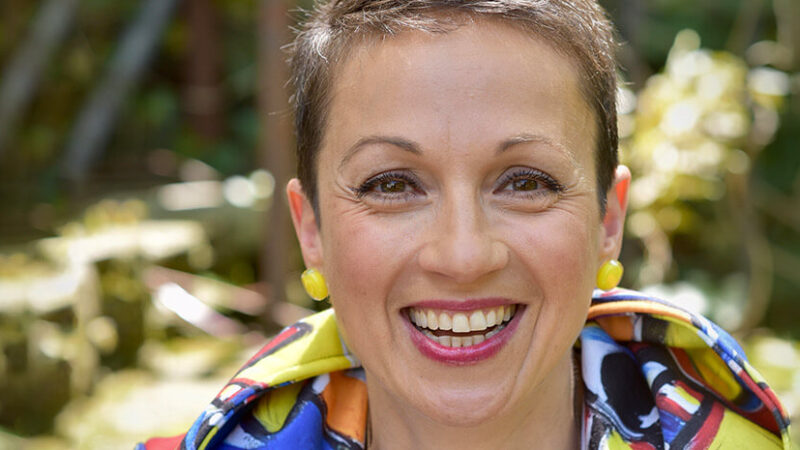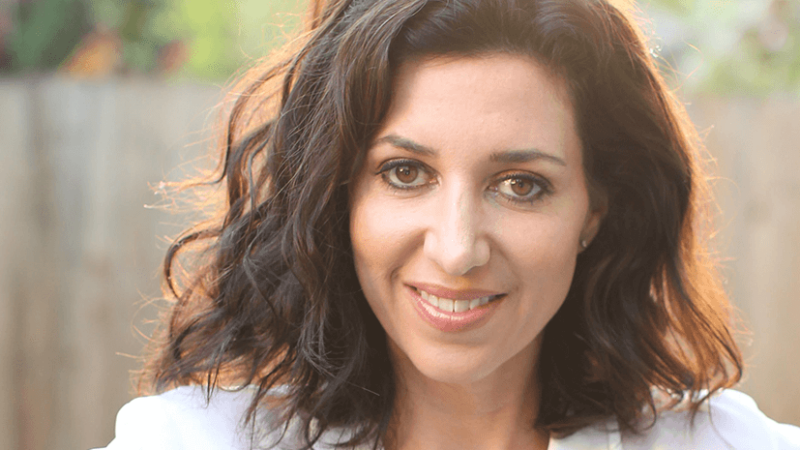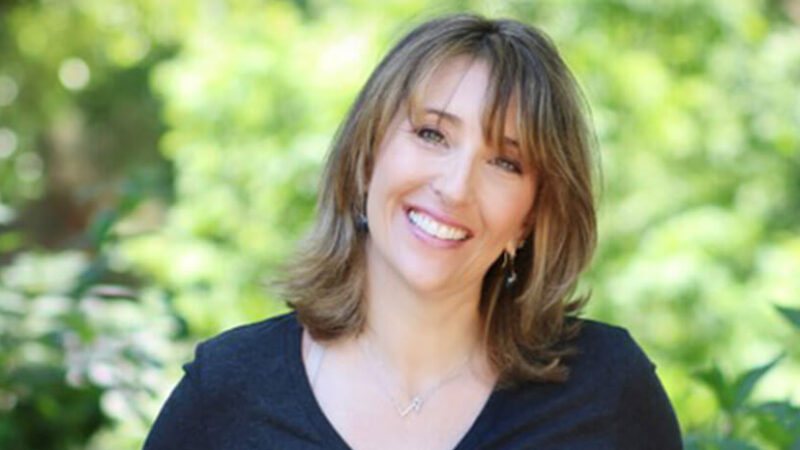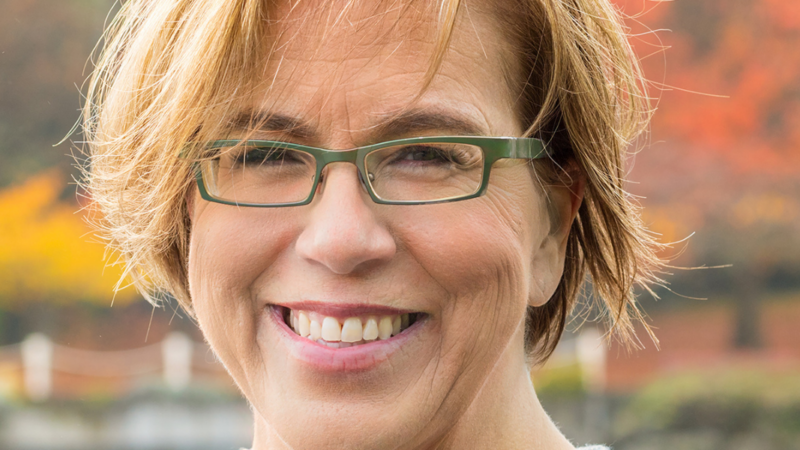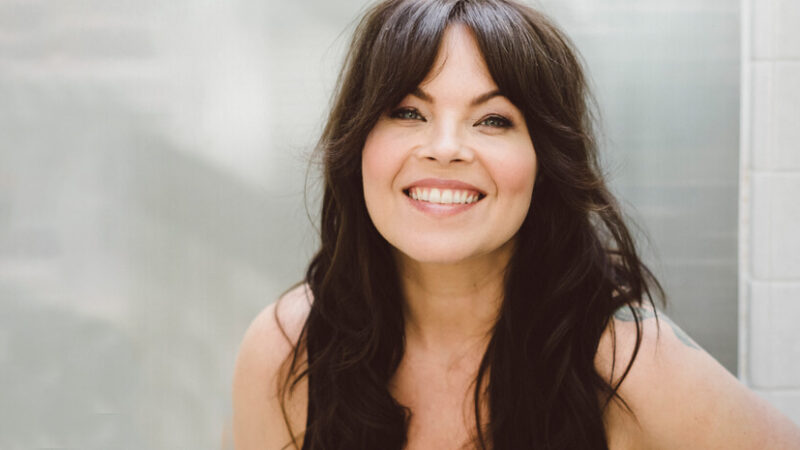-
E117: The Real Work: Letting Go from Within
Michael Singer — October 2, 2025
True spirituality isn’t about mystical experiences or lofty ideals—it’s about honestly facing...
-
Once More: Reflections on Reincarnation and the Gap Between Lives
Tami Simon — September 26, 2025
In this special reflection episode of Insights at the Edge host Tami Simon looks back on her...
-
Honey Tasting Meditation: Build Your Relationship with Sweetness
There is a saying that goes “hurt people hurt people.” I believe this to be true. We have been...
Written by:
Amy Burtaine, Michelle Cassandra Johnson
-
Many Voices, One Journey
The Sounds True Blog
Insights, reflections, and practices from Sounds True teachers, authors, staff, and more. Have a look—to find some inspiration and wisdom for uplifting your day.
Standing Together, and Stepping Up
Written By:
Tami Simon -
The Michael Singer Podcast
Your Highest Intention: Self-Realization
Michael Singer discusses intention—"perhaps the deepest thing we can talk about"—and the path to self-realization.
This Week:
E116: Doing the Best You Can: The Path to Liberation -
Many Voices, One Journey
The Sounds True Blog
Insights, reflections, and practices from Sounds True teachers, authors, staff, and more. Have a look—to find some inspiration and wisdom for uplifting your day.
Take Your Inner Child on Playdates
Written By:
Megan Sherer
600 Podcasts and Counting...
Subscribe to Insights at the Edge to hear all of Tami's interviews (transcripts available, too!), featuring Eckhart Tolle, Caroline Myss, Tara Brach, Jack Kornfield, Adyashanti, and many more.
Most Recent
The Awesome Human Project
Nataly Kogan is an entrepreneur, speaker, and author on a mission to help people cultivate their “Awesome Human” skills by making simple, scientifically backed practices part of their daily lives. The author of the books Happier Now and The Awesome Human Project, she has appeared in hundreds of media outlets, including the New York Times, the Wall Street Journal, TEDxBoston, SXSW, and the Harvard Women’s Leadership Conference. In this podcast, Sounds True founder Tami Simon speaks with Nataly about how we can live in a way that enables us to thrive while we give all of our gifts. They also discuss developing the five skills of emotional fitness; the practice of “struggle awareness” when faced with a challenge; overcoming the brain’s negativity bias, and the art of “courageously talking back to our brains” with kindness and compassion; the five traits of the Awesome Human; a leader as someone who positively impacts another person’s ability to flourish; sharing your emotional “whiteboard” to support the best possible interactions with others; the concept of “surface acting” at work and how it contributes to burnout; investing in a daily check-in with yourself; the power of self-compassion and self-acceptance; self-care as the skill of fueling your emotional, mental, and physical energy; and connecting to your “bigger why.”
A Love Letter to Friendships . . . And How to Break Up...
Erin Falconer is an author, digital entrepreneur, and the editor-in-chief and co-owner of PickTheBrain, one of the most trusted self-improvement communities online. She was named “one of the top digital entrepreneurs in Los Angeles” by Los Angeles Confidential and one of the “Top 10 Women Changing the Digital Landscape for Good” by Refinery29. She has a master’s degree in clinical psychology and is the author of the books, How to Get Sh*t Done: Why Women Need to Stop Doing Everything So They Can Achieve Anything and, with Sounds True, How to Break Up with Your Friends: Finding Meaning, Connection, and Boundaries in Modern Friendships.
In this podcast, Sounds True’s founder, Tami Simon, speaks with Erin Falconer about the unique power of our personal friendships and how we can work to improve them—or let them go if necessary. Tami and Erin also discuss: opening to our inner guidance and the voice of truth within, why taking 100 percent responsibility for our lives leads to 100 percent freedom, taking an audit of your friendships—including what Erin calls “exposing the mediocrity,” self-knowledge and personal energy management, bringing clearer intentionality and deeper commitment to our friendships, difficult conversations and applying the concept of “rupture and repair” to relationships with friends, making amends in previous friendships, Erin’s “friendship questionnaire,” and much more.
A Soberful Life
Veronica Valli is a former psychotherapist who now works as a sobriety coach. With almost 20 years of experience, she has helped thousands of people live happy, healthy lives and reach their full potential by being alcohol free. She’s been the keynote speaker at annual conferences such as Women for Sobriety and Soberistas, and she is the cohost of the popular Soberful podcast.
In “A Soberful Life,” Sounds True founder, Tami Simon, speaks with Veronica about her new book, Soberful: Uncover a Sustainable, Fulfilling Life Free of Alcohol. Tami and Veronica also discuss: making a cost-benefit analysis of your own relationship with alcohol; alcohol-free living as a new norm for our society; finding a community of sober people, and other lifestyle changes; the myth of willpower; honoring an inner call to growth; why we need skills and support (not strength) to quit drinking for good; the five pillars of sustainable sobriety; the importance of boundaries; human connection and the power of vulnerability; the art of finding balance in ever-changing circumstances; understanding how our past shows up in our present; a trauma-informed approach to recovery; two primary childhood needs: attachment and authenticity; how “doing the right next thing” gets us where we need to go; and more.
Customer Favorites
Meet the author of . . . P.S. I Love You More Than Tun...
The Author
Sarah Chauncey is the coauthor of P.S. I Love You More Than Tuna along with illustrator, Francis Tremblay, coming October, 2020. She has written and edited for nearly every medium over the past three decades, from print to television to digital. Her writing has been featured on EckhartTolle.com and Modern Loss, as well as in Lion’s Roar and Canadian Living. She lives on Vancouver Island in British Columbia, where she divides her time between writing, editing nonfiction, and walking in nature. Learn more at sarahchauncey.com.
The Book

Our cats occupy a unique space in our hearts. When they’re gone, the loss can be devastating, the grief profound.
P.S. I Love You More Than Tuna gives us an opportunity to give friends, loved ones, or ourselves tangible comfort during the grieving period, when so many of us feel isolated and misunderstood after a beloved pet dies.
Send us a photo of your sacred space.
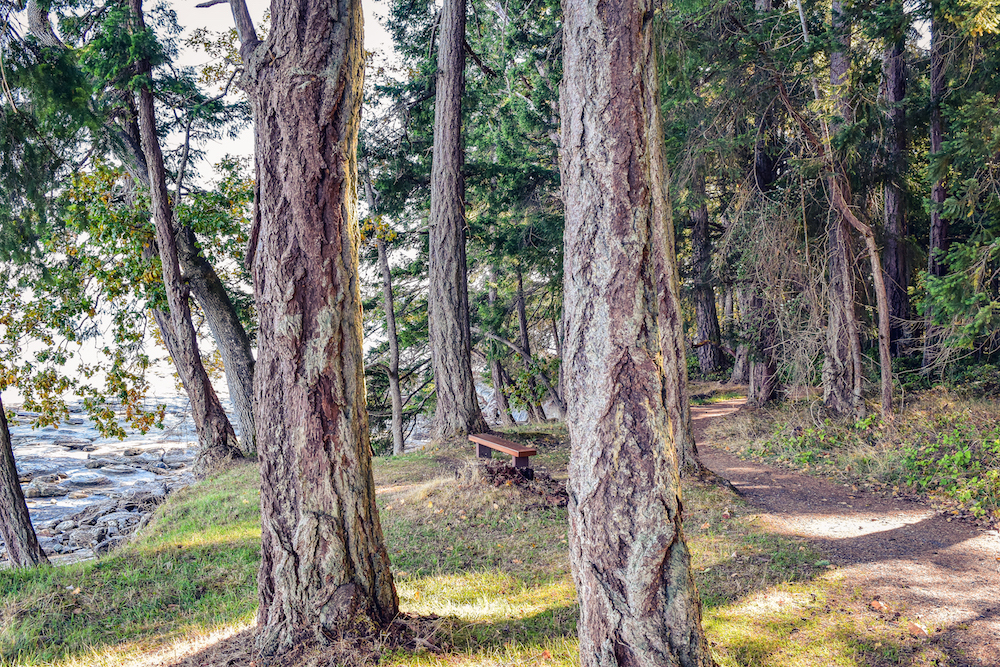
First Nation, Saysutshun Newcastle Island is an ancient forest and marine provincial park. Saysutshun, I’m told, means “training or preparation ground,” and indeed, for millennia before colonization, the Snuneymuxw brought healers to this small island to train “mentally, physically, and spiritually.” I knew none of this history when I first began walking long stretches of the uninhabited island’s 13.6 miles of trails. I only knew that the island seemed to lift away anything that wasn’t essential, easing my mind and making way for creative ideas to flow. I’d walk a bit, then sit and meditate, write for a while, then walk some more. This bench, under a circle of seven trees, became my favorite writing and meditation spot. The moss-covered trees became my friends, teaching me to stay rooted when things around me change. As I wrote in a 2016 essay about the island, “I have become a literal tree-hugger, and even—when nobody is looking—a tree-kisser.”
What was your favorite book as a child?
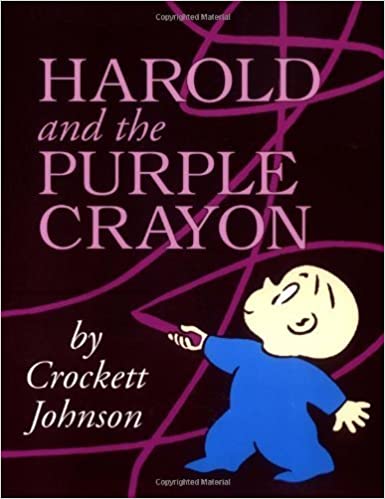
I was a total bookworm as a child. Instead of playing games at recess, I preferred to curl up under my desk and read. Of all the books I read—from every Encyclopedia Brown to Freaky Friday to The Short Stories of Ernest Hemingway (I was a precocious kid), the book with the most enduring impact was also the simplest: Harold and the Purple Crayon. I was enchanted by Harold’s adventures, amazed by his ability to draw his way out of every obstacle and ultimately find his way home. Long before I began seeing this as a metaphor for creativity (and life!), this story appealed to me. Fifty years later, I continue to find new layers of meaning in this little book. It’s a simple yet profound testament to the power of imagination and creativity.
What is one unexpected thing or habit that inspires your writing practice?
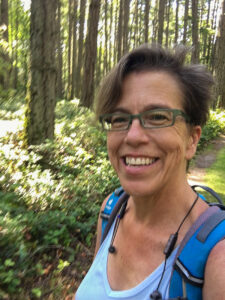
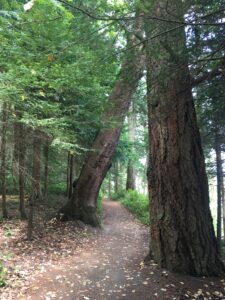
Walking in nature is my creative “secret sauce” and the central practice to my writing. Several years ago, I realized that although my role in this world is as a writer, my job is to bring myself back into presence, over and over, to get into a place where words can flow through me. I walk to get out of my mind and into my body. I come into fierce presence by noticing the rain on my face, salal berries ripening into deep blue, or the texture of earth beneath my feet. When my body is occupied by walking, ideas bubble up from my subconscious. Whether I’m looking for ways to trim an over-long essay or searching for words to evoke a hard-to-articulate experience, as soon as my legs find their rhythm, ideas begin to flow.
Learn More

Sounds True | Amazon | Barnes&Noble | Bookshop | Indiebound
Danielle LaPorte: How to Be Loving
What changes when you see yourself and others through a Loving gaze? Everything. With her latest book, How to Be Loving, Danielle LaPorte shares a joyous new framework for bringing incandescent Love to every part of your life. In this podcast, Tami Simon speaks with Danielle about her new book and our individual roles in what she calls “the epic shift of our time.”
Give a listen to this inspiring conversation about shining your inner light, as Tami and Danielle discuss a range of topics including the power of taking a vow, softening a critical attitude, the counterculture nature of self-acceptance, shifting out of misidentification, the shadow side of accountability, the practice of intentional recollection, everyday gentleness, a guided virtue blessing, the epic shift of our time, and more.
Note: This episode first aired live and on video on Sounds True One. To watch Insights at the Edge episodes live and on video, and to access additional bonus Q&A, please visit join.soundstrue.com to learn more.
Let the Dark Places Be Teachers
FIND THE SOURCE
This is a tender exercise, a tracing of pain, the path back to the deepest wound. For myself, a huge hurt that I carry is often the source of great realizations and growth. I’ve worked with many different types of therapy for years to figure out where my pain stems from, and my curiosity has been my greatest guide in this effort. I want to know why I am the way I am, and my trauma informs so much of my mindset. Do you know where your pain comes from? Does it point back to a certain occurrence? Do you have only a vague idea, a slight memory, that seems to be the source? What do you do to familiarize yourself with the hurt you carry?
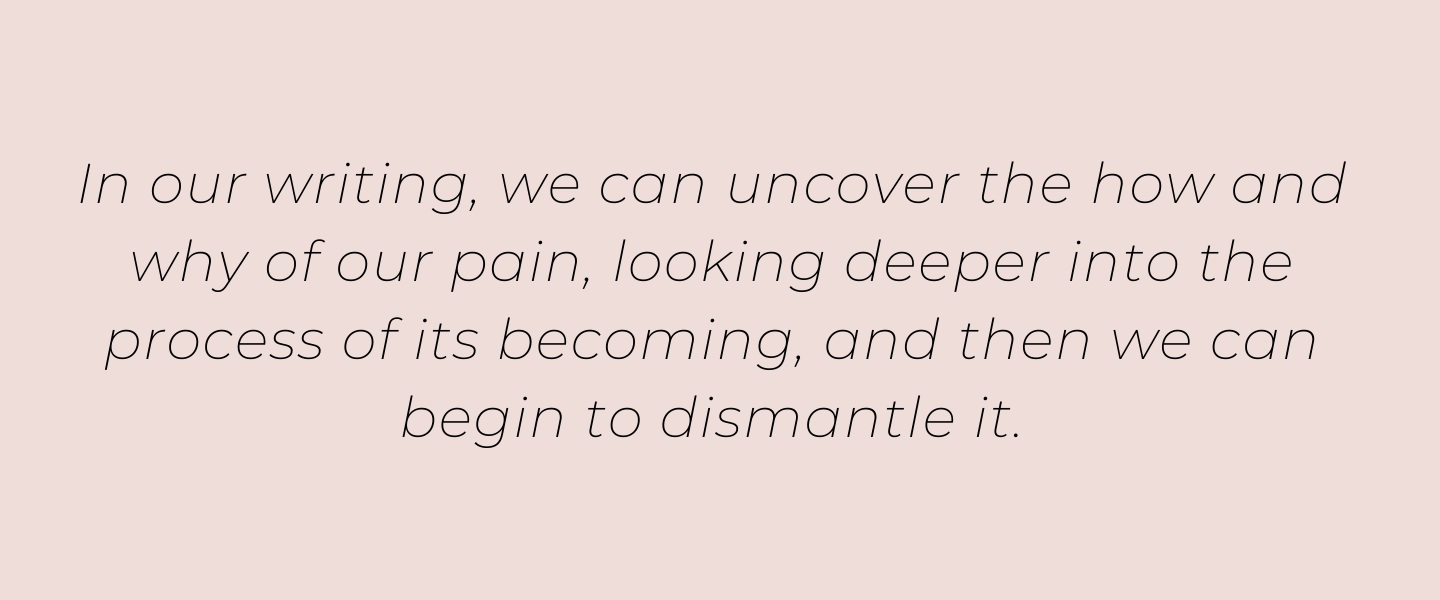
There are countless, well-trusted methodologies to help us become acquainted with our pain, and when we dig into this work, the cave of our understanding becomes incredibly deep.
I like to turn my pain into a guide. I follow its directions, meditating on where it all began. It’s at these starting points where I find the most potent feelings. My heartbreak from a failed relationship will often give me a chance to let out my sadness in verse, but not before I try to unpack the whole story. Only when I attempt to understand the many aspects of this failed relationship can I fully feel it and pay tribute to it. I begin this kind of investigation by rambling in my journal. Then, if I feel inclined, I might pull the heart of my understanding into poetic form. I recently wrote a book of poetry called Help in the Dark Season, which focuses on my childhood trauma, the way it affects my adult relationships, and the modes of healing that have helped me grow. Writing this book was extremely hard, but after I finished, I felt like I’d turned coal into gold. I pulled back the curtain inside myself and let light do its thing. Now I not only get to feel the inner effects of my work but I’m also able to witness the importance of sharing this book with others, the way my words act as a key to unlock their personal process of healing. The result of this revealing has been an honesty and a newness that I couldn’t have reached without the alchemy of writing poetry.
I urge you to do this hard work with your trauma, if you’re able. Give yourself permission to move into the realm of blame. Maybe move beyond it toward forgiveness.
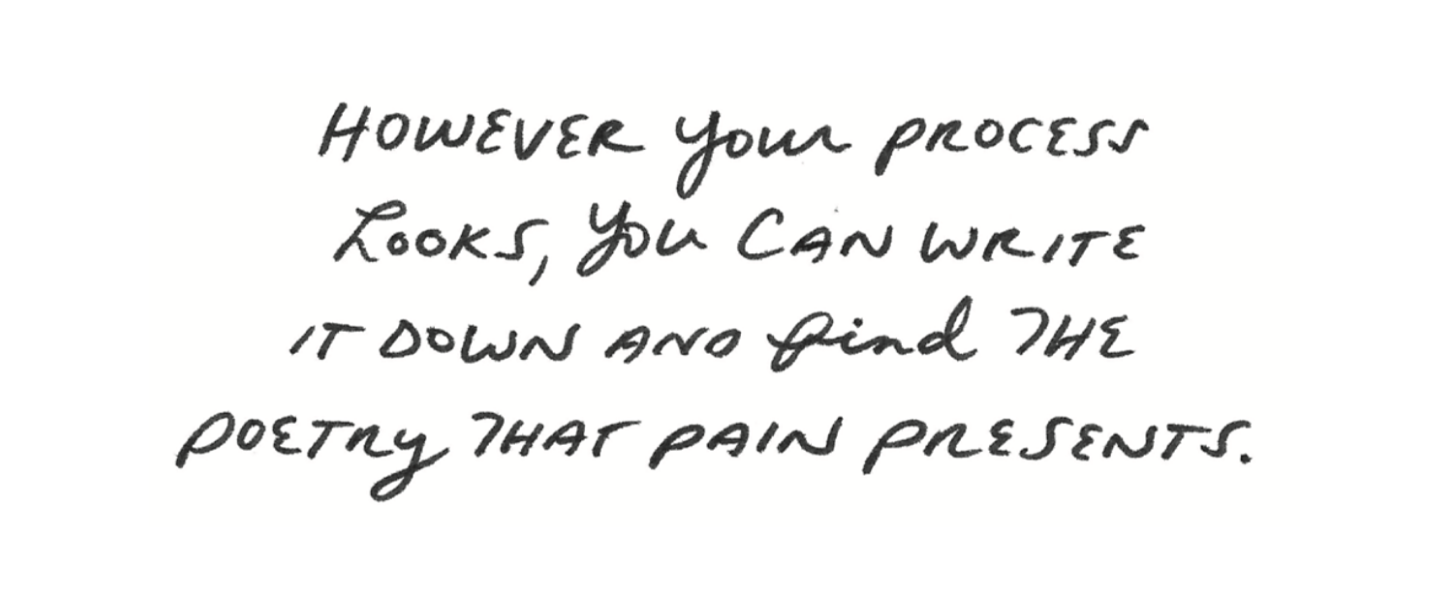
Our traumas create our fears, and our responses to these fears can be as poetic and beautiful as we make them. Let your pain be a source of inspiration, turn this heavy load into poetry, own it, use it, and take as much from it now as it has taken from you in the past.
Close your eyes and meditate on the hidden ache you carry. I like to start with my childhood because that’s what makes sense for me, but you can start anywhere along your timeline. Do you see any images attached to your discomfort? Can you try and put words to your grief and your loss? Who hurt you? What was their childhood like? Why did they do what they did? Make use of the pain of being alive. See the universality in whatever caused you harm, and focus on the connection to others who have survived similar experiences. When I sit with my wounds, I find my resilience, and that makes me want to linger there, gather up the lessons left in the aftermath, and use them for my own creation. Writing about my pain enables me to claim it as my own, and this ownership is empowering.
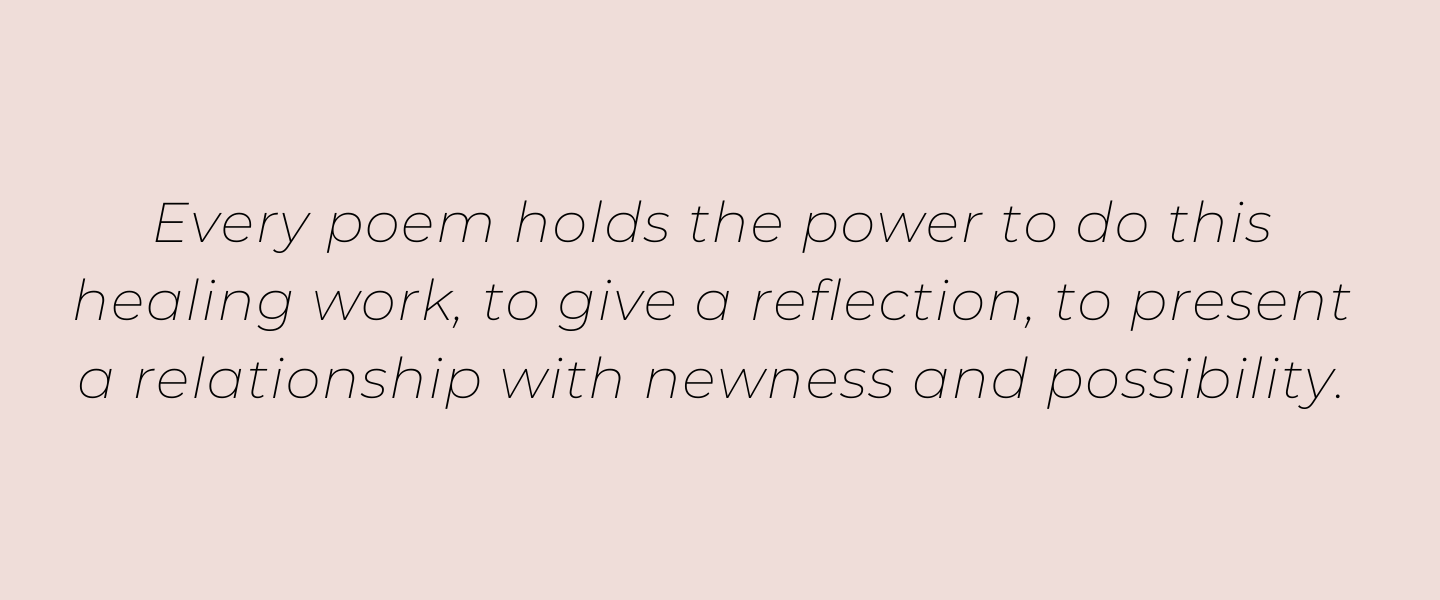
How can you show your reader your personal methods of self-care in a poetic way? Maybe start by writing a list of poems or even song lyrics that have been healing for you in the past. I have poems dog-eared and underlined in every book on my shelf, and I’ll pull them out in a moment of need. They’re my reminders that yes, it is indeed hard to be alive for everyone.
This is an excerpt from Every Day Is A Poem: Find Clarity, Feel Relief, and See Beauty in Every Moment by Jacqueline Suskin.

Jacqueline Suskin has composed over forty thousand poems with her ongoing improvisational writing project, Poem Store. She is the author of six books, including Help in the Dark Season. Her work has been featured in the New York Times, the Atlantic, and Yes! magazine. She lives in Northern California. For more, see jacquelinesuskin.com.
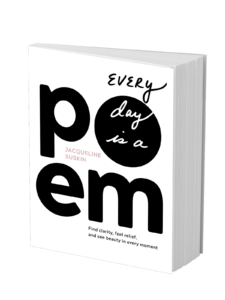
Sounds True | Amazon | Barnes & Noble | Indiebound | Bookshop

